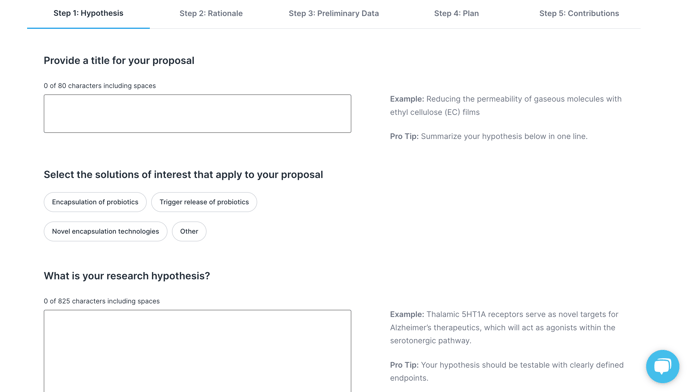Submitting a proposal:
Each funding opportunity (i.e. partnering request) on Halo accepts a single, standardized proposal that requires the minimum amount of information for an industry partner to determine next steps. This is intended to save innovators time. To access the submission form, please use the blue button labeled "Easy Apply" on the right side of the request page. Only proposals submitted through the proposal submission portal will be reviewed.
The entire proposal is the equivalent of a page and takes most innovators less than an hour to complete. There is no contractual obligation and a more detailed proposal may be requested should you be selected as a finalist. The proposal questions for partnering requests focused on solutions) are:
- Provide a title for your proposal (80 characters max including spaces)
- Select which of the industry partner’s solutions of interest your proposal should be categorized under (multiple choice)
- Describe your proposed solution in detail. (825 characters max including spaces)
- Explain why you believe this is a viable solution for this request. (825 characters max including spaces)
- Select the technology readiness level of your solution (multiple choice)
- Add validation for industry partner's must-have requirements (500 characters max including spaces per section)
- Outline your research or delivery plan for this solution. (1025 characters max including spaces)
- Add some of your most relevant publications, patents, and grants. (We recommend no more than 10 total)

Review process:
Halo is not involved in the review process and every proposal is sent directly to the industry partner. Once the innovator submits a proposal, they will receive an email from Halo's system letting them know what the estimated response timeline is from the industry partner.
Innovators can expect an initial response within 2 months from the submission deadline, where the industry partner will either decline the innovator’s proposal or advance it for further consideration. Proposals that the industry partner chooses to advance will then receive a detailed response, and if selected as a finalist, a direct outreach from the industry partner to arrange next steps off of Halo. Throughout this process, innovators will receive an email notification if their proposal is advanced, and can check the status of their proposal at any time in Account Settings > My Proposals.
If a proposal is declined:
The industry partner may provide some justification for declining the proposal (for example, being too early in development or not meeting requirements). The amount of feedback varies and depends on how many proposals the sponsor has received. Keep in mind that this is not a reflection on your proposal itself, but rather its fit for the industry partner's unique needs as a business.
About the Initial Response:
The industry partner will either advance or decline the proposal as an initial response. The innovator will learn if their proposal is relevant to the request and the industry partner’s current business needs. Please note that it is common for industry partners to provide an initial response without contacting the applicant directly.
About the Detailed Response:
If the proposal is advanced, in the initial response, this means that the applicant’s proposal has been deemed to be relevant to the request and the industry partner is interested in further evaluating its content. The innovator can then expect a detailed response within 3 months from receiving their initial response. In the detailed response, the industry partner will either select the proposal for the finalist evaluation or decline it with feedback.
Before providing a detailed response, the industry partner may reach out and ask clarifying questions about the proposal. The innovator should not include any confidential information in their response. If answering the question would require that they reveal confidential information, the innovator should inform the industry partner. If NDAs are necessary at this point or the industry partner is requesting a more formal proposal with budgets and timelines, it's best for the innovator to take the conversation off of Halo and loop in their tech transfer or corporate relations office, if applicable.
About the Finalist Evaluations:
If the innovator is selected as a finalist, they have reached the end of the review process on Halo. This means that the industry partner is interested in taking the conversation off of Halo and further evaluating the proposal alongside other finalists. Those in the finalist evaluation will receive an email with contact information for the industry partner (unless the industry partner has chosen to post their request anonymously) and the industry partner will contact the applicant directly regarding any next steps. In rare circumstances, the industry partner may also opt to contact the innovator via their Halo inbox.
